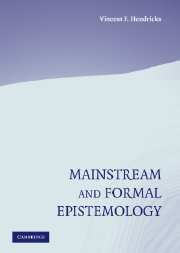5 - Contextual Epistemology
Published online by Cambridge University Press: 07 December 2009
Summary
The concept of knowledge is elusive – at least when epistemology starts scrutinizing the concept too much. According to Lewis's contextual epistemology, all there is to knowledge attribution in a given context is a set of rules for eliminating the relevant possibilities of error while succeeding over the remaining possibilities and properly ignoring the extravagant possibilities of error. Considering demons and brains as relevant possibilities of error is often what makes the concept of knowledge evaporate into thin air
FORCINGS knows that P iff S's evidence eliminates every possibility in which not-P – Psst! – except for those possibilities that we are properly ignoring.
David Lewis (1996)Contextualistic epistemology starts much closer to home. Agents in their local epistemic environments have knowledge – and plenty of it in a variety of (conversational) contexts. Knowledge is not only possible, as counterfactual epistemology demonstrates, it is a real and fundamental human condition.
The general contextualistic template for a theory of knowledge is crisply summarized in DeRose's (1995) description of the attribution of knowledge. The description also embodies many of the epistemological themes central to the contextualistic forcing strategy:
Suppose a speaker A says, ‘S knows that P’, of a subject S's true belief that P. According to contextualist theories of knowledge attributions, how strong an epistemic position S must be in with respect to P for A's assertion to be true can vary according to features of A's conversational context. (p. 4)
The incentive to take skeptical arguments to knowledge claims seriously is based on an exploitation of the way in which otherwise operational epistemic concepts, notably knowledge, can be gravely disturbed by sudden changes of the linguistic context in which they figure.
- Type
- Chapter
- Information
- Mainstream and Formal Epistemology , pp. 62 - 79Publisher: Cambridge University PressPrint publication year: 2005



